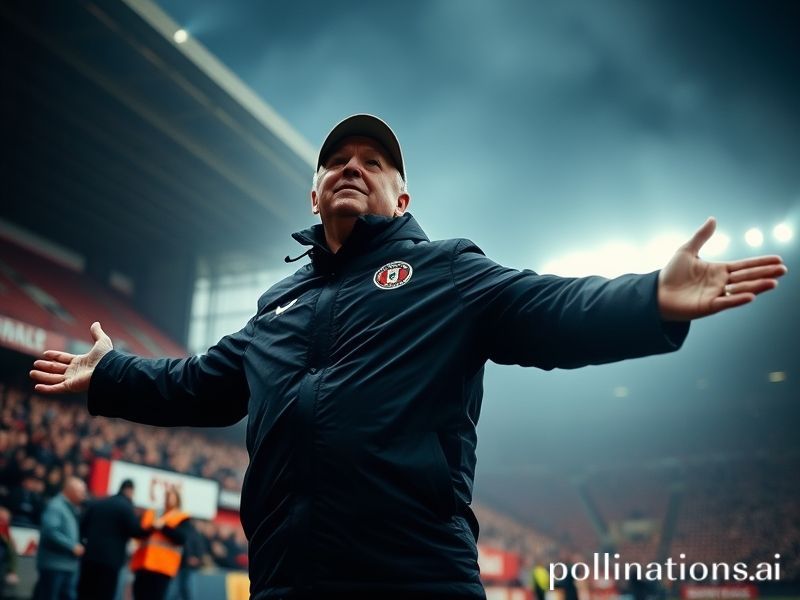Chris Wilder’s Sheffield United Exit: A Global Parable of Football, Failure, and Petrodollar Patience
Chris Wilder, Sheffield United, and the Global Art of Not Quite Dying
By our correspondent in the away end, nursing a £7 pie and an existential crisis
The official line is that Sheffield United “parted company” with Chris Wilder on 25 March, which is boardroom code for “we fired him by WhatsApp while the rest of the planet was doom-scrolling about the collapse of global supply chains.” In the cosmic spreadsheet of 2024, another relegated English football club barely registers; after all, children are still being conscripted in the Sahel and the Arctic is on sale for oil exploration. Yet the Wilder saga is worth a moment—if only because it offers a tidy parable for how late-capitalist institutions everywhere now handle failure: loudly, expensively, and with a PowerPoint that blames the algorithm.
Wilder is, by any sane yardstick, the most successful Sheffield United manager since the invention of the penalty kick. He dragged them from League One to the Premier League, then gave the EPL a proper Yorkshire welcome—ninth place, two points off Europe, and a set of overlapping centre-backs that had hipster analysts in Brooklyn coffee shops spilling oat-milk lattes in admiration. Three years later, he returns to collect his P45 as the club sits bottom, 11 points from safety, with a goal difference that resembles a failed cryptocurrency.
Globally, the pattern is familiar. From Silicon Valley start-ups to Japanese trading houses, executives first rebrand catastrophe as “pivoting,” then commission a branding agency to design a new font for the apology email. Sheffield United’s statement thanked Wilder for his “passion and commitment,” corporate phrasing that roughly translates to “we loved you right up until the balance sheet screamed.” The club’s owner, Abdullah bin Mosaad bin Abdulaziz Al Saud—a Saudi prince whose family portfolio makes the GDP of Latvia look like loose change—reportedly lost patience after spending £150 million to finish below Burnley. In Riyadh, that’s the equivalent of misplacing a Lamborghini; in Sheffield, it’s enough to re-roof half of Park Hill.
International audiences might ask why any of this matters. The answer is that football is now the world’s most reliable index of geopolitical mood. When Real Madrid can flirt with Kylian Mbappé while half of Lebanon is dark, and when Chinese streaming platforms pull the plug on Serie A because someone waved a Tibetan flag, the game has become a rolling data set for soft-power anxiety. Wilder’s dismissal is therefore not parochial but diagnostic: it shows how even provincial English clubs have turned into venture-capital stress toys, squeezed between petrodollars, hedge-fund algorithms, and fans who still believe sport should be about community rather than leveraged buyouts.
Consider the collateral damage. Wilder’s sacking triggered a run on betting markets from Manila to Malta, where punters who had staked on Sheffield United to finish with the worst top-flight points total suddenly feared a “new-manager bounce.” (They needn’t have worried; the bounce turned out to be the club tripping over its own shoelaces.) Meanwhile, the Blades’ official noodle partner in Vietnam issued a press release “reaffirming commitment,” apparently unaware that local consumers think Sheffield is a type of cheese. Somewhere in Lagos, a counterfeit shirt vendor is already printing “WILDER 1986” kits, because Nigerians have an admirable tradition of honouring fired managers faster than the clubs that fired them.
What happens next is as predictable as an Elon Musk apology. Sheffield United will appoint a continental coach with a glossy LinkedIn profile, lose the next four games, and then release a statement about “building a sustainable identity.” Wilder, meanwhile, will be linked with the Greece national job—an offer that sounds glamorous until you remember Greek football is currently being investigated by Interpol for match-fixing. If he’s lucky, he’ll end up at a Championship club with an owner who made his fortune in online gambling and thinks analytics is a type of Greek yoghurt.
And so the carousel spins, powered by money that smells faintly of diesel and regret. On the streets of Sheffield, supporters will mutter that at least the local chippy still knows their order. In a world where billionaires treat civic institutions like Monopoly pieces, that counts as resistance. The rest of us, watching from safer time zones, can only raise a glass to the glorious, doomed persistence of human hope—and to Chris Wilder, who proved you can take a town to the promised land, but you can’t make the owners stay for the sermon.







